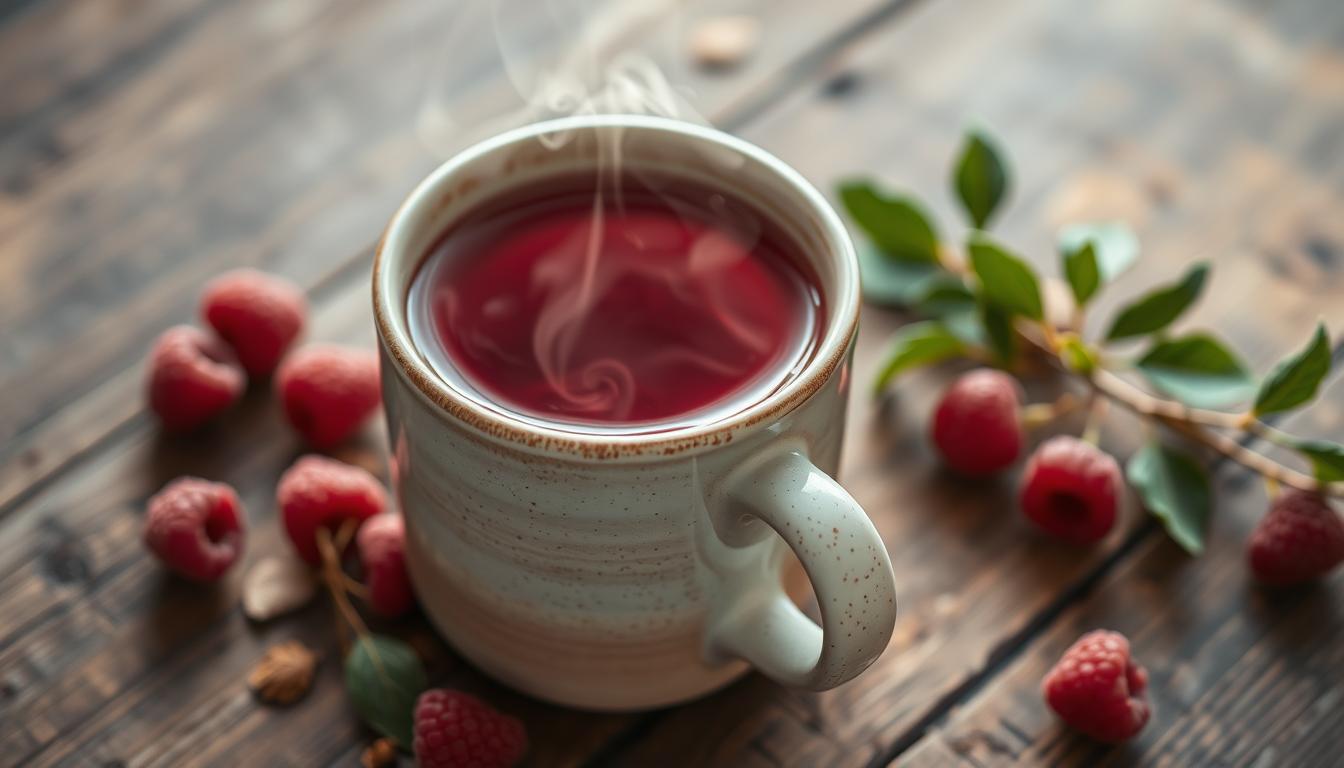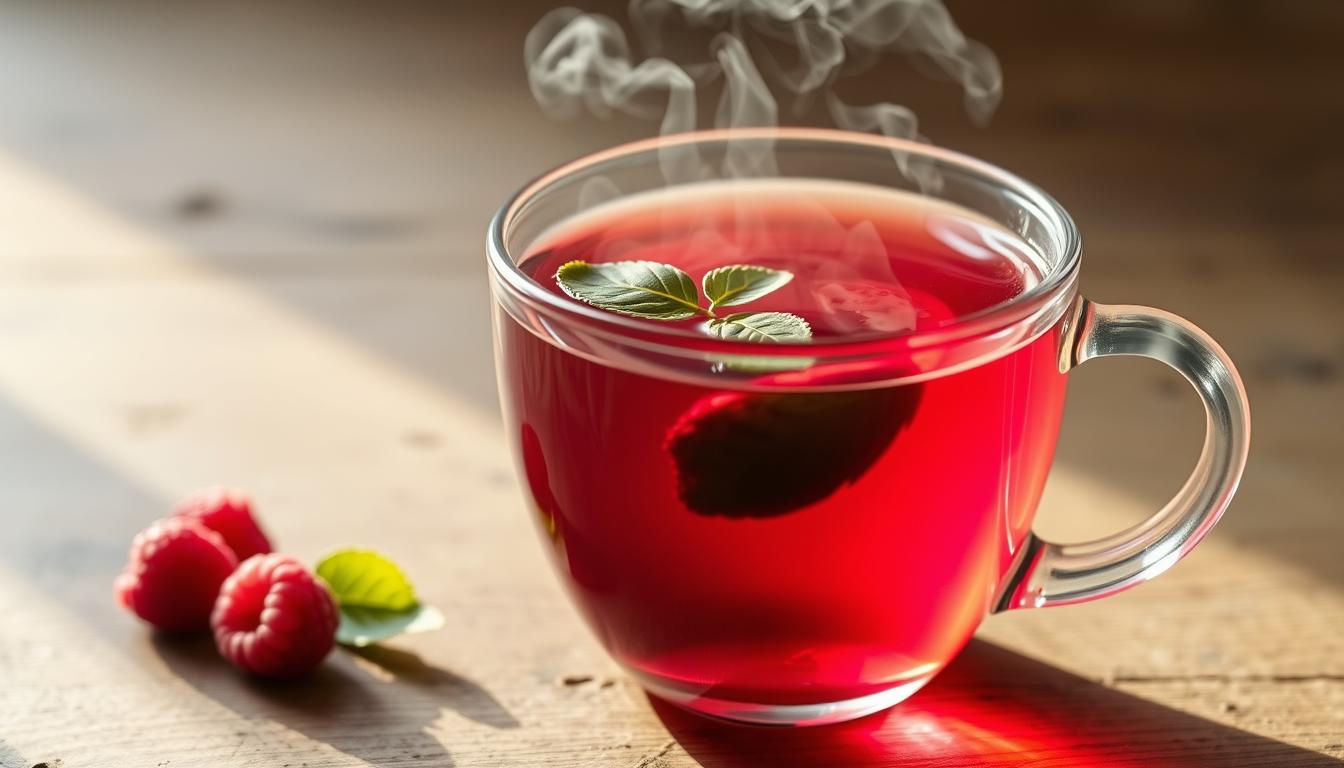Did you know that over 159 million Americans drink tea every day? With so many varieties available, it’s no wonder people are curious about their favorite brews. One common question is whether raspberry tea contains caffeine. This article dives into the details to give you a clear answer.
Pure raspberry leaf tea is naturally caffeine-free, making it a great choice for those avoiding stimulants. However, some blends may include caffeinated tea bases, so it’s essential to read labels carefully. Brands like Yogi often mix ingredients, which can affect caffeine content.
Beyond caffeine, this guide explores the origins, benefits, and historical use of raspberry tea. You’ll also find nutritional insights, brewing tips, and alternative infusions. Whether you’re a tea enthusiast or just starting, this comprehensive guide has you covered.
Key Takeaways
- Pure raspberry leaf tea is naturally caffeine-free.
- Some blends may include caffeinated tea bases.
- Always check labels for accurate caffeine information.
- Raspberry tea offers historical and nutritional benefits.
- Explore brewing tips and alternative infusions for variety.
Exploring the Origins and Benefits of Raspberry Tea
For centuries, raspberry leaf tea has been a staple in traditional remedies. Its roots trace back to ancient cultures, where it was prized for its medicinal properties. Today, it remains a popular choice for those seeking natural health solutions.

Historical Background and Traditional Uses
Raspberry leaf tea has a rich history, particularly in women’s health. It was commonly used to ease menstrual cramps, reduce nausea, and support pregnancy. Many cultures passed down recipes and remedies, making it a cherished part of their heritage.
This tea was also valued for its mild, earthy flavor. It was often brewed as a comforting drink, enjoyed for both its taste and its healing properties. Traditional practices highlight its role in natural wellness, a legacy that continues today.
Health Benefits and Nutritional Insights
Raspberry leaf tea is packed with essential nutrients. It contains vitamins B, C, and E, along with magnesium and potassium. These elements contribute to its reputation as a healthful beverage.
Many people turn to this tea for its potential to alleviate discomfort and promote overall well-being. Its natural properties make it a favorite among those seeking a gentle, effective remedy.
| Nutrient | Benefit |
|---|---|
| Vitamin B | Supports energy levels |
| Vitamin C | Boosts immune system |
| Vitamin E | Promotes skin health |
| Magnesium | Helps with muscle relaxation |
| Potassium | Regulates blood pressure |
Whether you’re sipping it for its flavor or its benefits, raspberry leaf tea offers a unique blend of tradition and wellness. Its enduring popularity is a testament to its value in both historical and modern contexts.
Understanding Does Raspberry Tea Have Caffeine?
Curious about the caffeine content in your favorite brew? The answer depends on the type of infusion you choose. Pure red raspberry leaf tea is naturally caffeine-free, making it a safe option for those avoiding stimulants. However, blends with black or green tea can introduce caffeine, so it’s essential to know what you’re drinking.

Pure Raspberry Leaf Tea: Naturally Caffeine-Free
Red raspberry leaf tea is an herbal infusion made from the leaves of the raspberry plant. Unlike traditional teas, it contains no caffeine. This makes it a popular choice for individuals sensitive to stimulants or those looking for a calming drink.
Its caffeine-free nature stems from its botanical composition. Herbal infusions like this are derived from plants that don’t naturally produce caffeine. This sets them apart from teas like black or green, which come from the Camellia sinensis plant.
When Caffeine May Appear in Raspberry Tea Blends
While pure raspberry leaf tea is caffeine-free, many blends mix it with black or green tea. These combinations can introduce caffeine into your cup. For example, a raspberry black tea blend will likely contain stimulants.
Brewing time also plays a role. Longer steeping can extract more caffeine from blended teas. If you’re monitoring your intake, opt for shorter brewing periods or stick to pure herbal infusions.
Always check the ingredients list. Terms like “black tea” or “green tea” indicate the presence of caffeine. Brands like Yogi often blend ingredients, so reading labels is crucial for accurate information.
Managing caffeine sensitivity is easier when you know what’s in your cup. Whether you choose pure raspberry leaf tea or a blended option, understanding the details ensures you enjoy your drink without surprises.
Raspberry Tea Variants and Caffeine Considerations
Exploring the world of raspberry tea reveals a variety of flavors and caffeine levels. Whether you’re looking for a bold, energizing brew or a calming, caffeine-free option, there’s a variant to suit your preferences. Understanding the differences can help you make the perfect choice.
Caffeinated Options: Raspberry Black and Green Tea
Raspberry black tea is a popular choice for those who enjoy a robust flavor with a caffeine kick. Typically, it contains 60-90 mg of caffeine per serving, making it ideal for mornings or midday pick-me-ups. Brands like Bigelow offer blends that combine the fruity notes of raspberry with the richness of black tea.
For a milder option, raspberry green tea provides a moderate caffeine boost. With around 25-35 mg per serving, it’s a gentler alternative that still delivers a refreshing taste. Its light, earthy flavor pairs well with the sweetness of raspberry, creating a balanced infusion.
Alternative Herbal and Fruit Infusions
If you prefer to avoid caffeine, herbal and fruit infusions are excellent choices. Raspberry rosehip tea blends the tartness of rosehips with the sweetness of raspberry, offering a caffeine-free option packed with vitamin C. Hibiscus and raspberry tea is another vibrant choice, known for its deep red color and tangy flavor.
Other caffeine-free alternatives include raspberry lemon and raspberry mint teas. These blends combine fruity and herbal notes for a refreshing experience. They’re perfect for relaxing evenings or as a hydrating treat throughout the day.
- Raspberry black tea: Bold flavor, 60-90 mg caffeine per serving.
- Raspberry green tea: Milder taste, 25-35 mg caffeine per serving.
- Raspberry rosehip tea: Caffeine-free, rich in vitamin C.
- Hibiscus raspberry tea: Tangy and vibrant, caffeine-free.
- Raspberry lemon and mint teas: Refreshing, caffeine-free options.
Blended teas can vary in caffeine content based on additional ingredients and brewing time. Always check labels to ensure you’re getting the desired caffeine level. With so many options, you’re sure to find a raspberry tea that fits your taste and lifestyle.
Conclusion
Raspberry leaf tea offers a unique blend of tradition and wellness, making it a versatile choice for many. Pure leaf tea is naturally free from caffeine, ideal for those avoiding stimulants. However, blends with black or green tea may contain caffeine, so checking labels is essential.
This herbal infusion has a rich history, valued for its nutritional benefits and soothing properties. Variants like raspberry black or green tea provide options for those seeking a mild pick-me-up. For caffeine-free alternatives, explore blends with rosehip or hibiscus.
Always read ingredient lists to ensure the desired caffeine level. Experiment with different types to find your perfect match. For personalized advice, consult a healthcare professional.
Whether you’re looking for relaxation or a gentle boost, there’s a raspberry tea option for every preference. Enjoy the journey of discovering your favorite brew!

